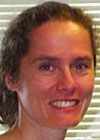 |
|
|
| Author |
Message |
Amy_Clapp

Joined: 23 Mar 2004
Posts: 84

|
 Posted:
Tue May 25, 2004 3:57 pm Posted:
Tue May 25, 2004 3:57 pm |
  |
Today was a good day for a couple of reason. First of all, everyone on our research team is here in Yakutsk and ready to head to Zhigansk tomorrow. Chris Guay, another researcher from the University of California-Berkley arrived this morning. Secondly, we all got some quality sleep and were functioning much better today. Thirdly, Oliver, the college student from Berkley, got his luggage today. This was a big surprise to me as I thought there was no way that it would get from Boston all the way to Yakutsk, but it did.

This morning, we spent a lot of time trying to send a picture over the Internet using the satellite phone. We will have to see if any of our attempts are successful. If they were not, it may be that the pictures will have to be posted when I return back to the States. I really hope that we are able to get some across, because there are so many fascinating things that I would love to show everyone.
Lena (one of the Russian students) and I went for a walk around Yakutsk this morning. She is from Moscow and was able to tell me a lot about this city. I found out that this city is one of the coldest in Russia. In the winter the temperature can get to be -70 degrees Celsius (Question #1 for the day is what is that in degrees Fahrenheit?). I can't even imagine what that is like because I found it nearly unbearable this winter in Vermont when it was -25 degrees Fahrenheit. I also found out that Yakutsk is one of the richest places in Russia because there are gold and diamond mines around here. When we make our way to Zhigansk tomorrow, we are going to be staying at a lodge that the miners stay at when they are working out here.
Chris, Max, and I also did a walking tour of part of the city. We stopped and got some food at one of the many stalls that exist along the road here. We bought a loaf of a sweet bread and Max bought what he was hoping was going to doughnuts. However, they ended up being two wafer cookies with peanut butter spread between them, and with a chocolate frosting on top. I was very happy with his mistake, as I found a Russian version of a Reese's Peanut Butter Cup!! We also bought some fresh fruit, which I was told was hard to come by in Siberia. However, I have had great salads here every night so far. I know that may change tomorrow when we leave the big city of Yakutsk for the small village of Zhigansk.
The bulk of our day today was spent at the Institute for Biological Problems of the Cryolithozone at the Russian Academy of Sciences. We met with a man named Dr. Roman Desyatkin, who runs the center which is concerned with the natural processes that happen in this part of Russia and the effects of change on permafrost ecosystems. He had some interesting things to say about some of the changes that are happening in this permafrost zone. The scientists all talked about the role of forest fires in river discharge. This is the second question that I want you to think about and respond to. Imagine there are a lot of forest fires on the land in the Lena River watershed (the watershed is the land where if any water that comes from the sky falls on it or any snow that lands and melts on it will eventually end up in the Lena River). Would there be more water ending up in the river or less water ending up in the river?

I'm waiting to hear some responses to some of the other questions that are out there for you to answer. They are:
1.) How are clouds formed?
2.) If we left Moscow at 7:50 p.m. and the flight was 6 hours and we moved 5 time zones ahead, what time was it when we landed in Yakutsk?
3.) How do satellite phones work? The first thing to do is to figure out what a satellite is and for that I will give you this clue: the moon is a satellite. Once you figure out what a satellite is, maybe you can explain to me why, about every 15 minutes, the satellite phone looses connection?
4.) What natural boundary separates Europe from Asia?
5.) Yakutsk has what is called a continental climate? What does that mean?
6.) What is -70 degrees Celsius in degrees Fahrenheit?
7.) Would there be more water ending up in the Lena River or less water ending up in the Lena river if there were a lot of forest fires in its watershed?
Now I am going to pack all my stuff so that we are ready to leave tomorrow to get to the Zhigansk. We got word from the captain of the boat today that the ice that is on the river should break in the next 6 days. This is great news because we will get to see the ice breaking which should look really cool and we will be able to get some good water samples completed!

First look at the icy Lena River from the plane arriving in Yakutsk.
I'll write tomorrow from Zhigansk!!
Amy |
|
|
    |
 |
|
|
|
View next topic
View previous topic
You cannot post new topics in this forum
You cannot reply to topics in this forum
You cannot edit your posts in this forum
You cannot delete your posts in this forum
You cannot vote in polls in this forum
You cannot attach files in this forum
You can download files in this forum
|
Powered by phpBB 2.0.11
© 2001, 2002 phpBB Group :: FI Theme ::
All times are GMT
| |
